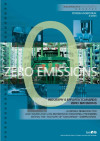Suchergebnisse
Green Biorefinery - Separation of Proteins from Grass Juice (Green Juice)
Research and development of the technical process to separate protein from grass juice to gain high-protein concentrate for animal feed by ultra-filtration and other separation technologies.
Production of bioethanol in addition with heat, power and valuable byproducts
The production of bioethanol in Bruck/Leitha in addition to the production of heat, power and valuable by-products from biomass will be optimized by a new process simulation tool under the target of maximum usage of waste and low temperature heat and optimal source and product usage.
Waste heat utilisation and use of renewable energy sources in a metal-working enterprise
Use of waste heat and covering of the remaining energy demand by the renewable energy sources hydropower and biomass in a metal-processing company.
Energy center for the production of heat, power, substitute natural gas and liquid biofuels
The project deals with the production of synthesis gas from biological fuels and biological residues using steam blown gasification. This synthesis gas will be used for polygeneration especially for heat, power, gaseous (substitute natural gas, SNG) and/or liquid fuel production.
Immobilization of Lipases on Corn Cob Granulate - New Key Technology for Biodiesel Production
The main objective of the project is to improve the method for producing biodiesel by enzymatic catalysis.The target is to find a method to catalyze the production of fatty acid methyl esters by corn-cob-immobilized lipases which can be used in industrial scale.
Development of a continuous hydrogen-carbon nanofibers production line
With the development of a hydrogen-carbon nanofiber production in a continuous process carbon nanofibers can be produced in an economic way and at the same time access to environmentally friendly hydrogen is enabled.
Green Biorefinery - Primary Processing and Utilization of Fibres from Green Biomass
Tests on optimisation of the essential process unit mechanical fractionation of the primary raw material "green biomass" into a liquid and a solid - fibres containing - fraction. Furthermore, lab and pilot scale tests with respect to technologies and processes for primary processing of the solid fraction (e.g. technologies for obtaining specified well defined fibre fractions, reduction of odour etc.). Finally, lab and pilot scale tests regarding manufacturing of prototype fibre products (fibreboards and adhesives & fillers for the construction sector) based on specific well defined fibre fractions from green biomass as primary raw material.
Renewable Raw Materials Pave The Way For Sustainability

Theoretical principles, chances & perspectives
Forschungsforum
3/1997
Herausgeber: BMVIT
Englisch, 6 Seiten
Downloads zur Publikation
Green Biorefinery - Separation of Lactic Acid from Grass Silage Juice (Brown Juice)
Development of a technical process to separate lactic acid from Brown Juice. Lactic acid is a promising chemical commodity which may be produced from silage juice at low costs and in an environmentally friendly way for subsequent synthesis of valuable products.
Chemical modification of wood particles for high value wood plastic composites
Based on promising preliminary work feasibility and recycling strategy of the modifying process shall be evaluated economically and ecologically.
Industry´s Efforts Towards Zero Emissions

Austrian Research for Low-Waste and Low-Emissions in Industrial Processes within the "Factory of Tomorrow" Subprogram
Forschungsforum
3/2004
Herausgeber: BMVIT
Englisch, 6 Seiten
Downloads zur Publikation
ZERMEG II - Zero emission retrofitting method for existing galvanising plants
ZERMEG II is the follow up project of ZERMEG, which was commissioned after the first call of the Austrian Factory of the Future program in 2001. The project developed a method to revamp existing galvanising plants in order to operate them with a maximum reduction of the use of chemicals and maximum recycling.
Solar thermal cooling system consisting of a parabolic trough collector field and a steam jet ejector chiller
A solar thermal cooling system consisting of a parabolic trough collector field and a steam jet ejector chiller has been developed. The necessary components were built and tested and finally put together to get an operating pilot plant at the test facility.
Innovative technology for the treatment of municipal and industrial waste water and process waters (INNOWATEC)
Evaluation of a technology as a supporting module for process water and waste water treatment and testing in laboratory and pilot tests for specific fields of application in operational water management.
Development of a comprehensive procedure within the design of high-speed-cutting processes in consideration of environmental protection and occupational health aspects
In the metal working industry high-speed-cutting (HSC) in connection with minimal quantity cooling-lubrication promises a high potential for saving process materials. On the one hand costs of purchase and disposal of metal working fluids (MWF) decrease, on the other hand the reduction of dermal diseases and emissions of MWF-dusts are expected.
Chemo-physical analysis and assessment of color alterations of selected hardwoods and development
Analyses of biochemical reactions causing colour changes during the hygrothermal treatment of selected hardwoods will lead to a model for defined and process-based colouration or maintenance of colour in drying and steaming processes. Based on this development the new drying and steaming schedules will be implemented in the industry.
SUPROMED: Reprocessing and Reuse of Single Use Medical Devices in the Light of Sustainable Development Criteria - Implementation in Austria
In contrast to other countries there is currently no reprocessing and reuse of single use medical devices in Austria. Thus the potential for major ecological and economical savings remains unused. In a stakeholder dialogue, practical implementation strategies were developed to change the trend towards a sustainable value-added chain.
CellPor - cellulose polymerized - new methods for the processing of a polymer-cellulose-foam according to ecological criteria in construction
The development of a spray applicable cellulose composite as insulating material on the basis of renewable resources, combined by the development of a prototype for the spray-on technology for processing the new, water free cellulose composite are the demanding challenges of this project.
Development of low emission cleaning processes for metal surfaces considering manufacturing processes within the automotive industry
Development of technological optimisation of cleaning processes within the automotive industry which guarantee defined cleaning requirements and fulfil the criteria of a sustainable process design with near zero emissions.
Green Biorefinery - Development of key separation technologies to extract lactic acid and other valuable substances from silage juice
Juice from pressed silage grass has a high content of lactate and free amino acids. The goal of this project is to develop a technology for the separation of these valuable products.
